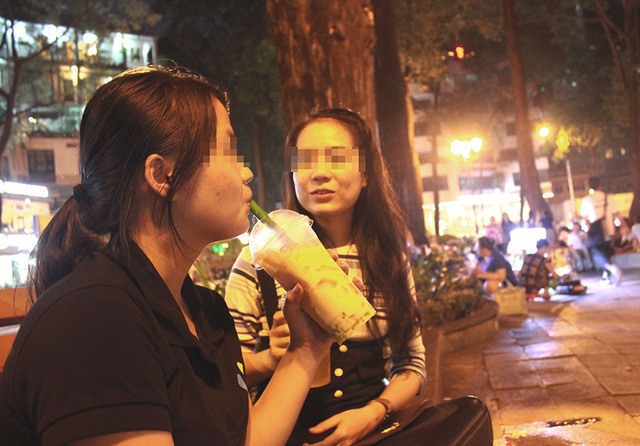Bubble tea raises health concerns
 |
| Drinking too much bubble tea can cause health problems. - Photo tuoitre.com.vn |
The latest case took place was on Monday when the force in collaboration with Hà Nội Police investigated the warehouse of Heekcaa Việt Nam Co, Ltd, and found hundreds of unlabeled tea bags and semi-finished products. Half of these bags had been repackaged and stamped with fake “Made in Việt
Bubble tea, also known as pearl milk tea or boba tea, originated in
Introduced into Việt
A representative of the National Institute for Food Control told Tuổi trẻ (Youth) newspaper that the Government should conduct a massive test on bubble tea quality as students are the main consumers of the product.
Hoàng Đại Nghĩa, head of Group 6 under the Hà Nội Market Management Force, stressed the serious risks of unqualified food.
“It will be hazardous for our children’s health if those drinks contain unclear chemicals,” he said.
The raw materials for bubble tea—black tea, milk powder and dried bubbles—are easily bought on
The price of bubble tea ranges from VNĐ12,000 up to 50,000 (US$0.5 to 2.2). Many students love it no matter how much it costs.
Nutrionist Trần Lan Hương worried that the huge amount of sugar in bubble tea might lead to obesity in young people.
Trần Minh Hạnh, deputy director of HCM City Nutrition Centre, said that though it was known as “milk tea”, bubble tea has no fresh milk at all. Milk powder, its main ingredient, contains mostly fat and less protein.
“Bubble milk tea is just a tempting drink. It should not been considered as ‘milk’ for daily intake,” she said.
Trần Ngọc Lưu Phương, head of the Digestive Disease Interventions Department under
The high amount of sugar combining with flavors and additives in bubble tea may lead to serious health problems, such as diabetes or high blood pressure.
“Bubbles made from tapioca make people feel full and tend to skip meals, leading to an imbalanced diet,” she said.
Besides bubble tea’s nutrient facts, the unhygienic mixing process has also raised alarm bells. According to Trần Trường Chinh, deputy chief inspector of Cần Thơ City Department of Health, investigations detected several bubble tea shops violating regulations of hygiene and food safety. With various home-made or imported ingredients, food poisoning may happen if bubble tea is made in dirty conditions, he said.
What the stars mean:
★ Poor ★ ★ Promising ★★★ Good ★★★★ Very good ★★★★★ Exceptional
Latest News
More News
- Tet event in Japan celebrates success of 14th National Party Congress (January 25, 2026 | 10:04)
- 14th National Party Congress wraps up with success (January 25, 2026 | 09:49)
- Congratulations from VFF Central Committee's int’l partners to 14th National Party Congress (January 25, 2026 | 09:46)
- List of newly-elected members of 14th Political Bureau announced (January 23, 2026 | 16:27)
- 14th Party Central Committee unanimously elects To Lam as General Secretary (January 23, 2026 | 16:22)
- List of members of 14th Party Central Committee announced (January 23, 2026 | 09:12)
- Highlights of fourth working day of 14th National Party Congress (January 23, 2026 | 09:06)
- Press provides timely, accurate coverage of 14th National Party Congress (January 22, 2026 | 09:49)
- Press release on second working day of 14th National Party Congress (January 22, 2026 | 09:19)
- Minister sets out key directions to promote intrinsic strength of Vietnamese culture (January 22, 2026 | 09:16)
















 Mobile Version
Mobile Version